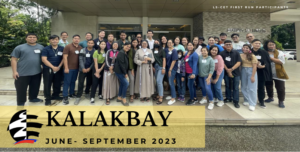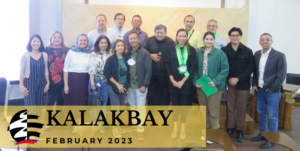The Laudato Si’ Certified Environmental Trainer (LS-CET) program recently celebrated the successful completion of its second run on February 24th, with 43 scholars hailing from various schools and dioceses. Comprising both teachers and administrators, this cohort represents a dedicated group committed to integrating environmental stewardship into education.
The second iteration of the LS-CET program witnessed a diverse array of participants, reflecting the program’s inclusive approach to environmental education. Scholars hailed from different schools and dioceses, bringing with them unique perspectives and experiences that enriched the learning environment.
Throughout the duration of the program, scholars engaged in a comprehensive curriculum that covered a wide range of environmental topics, including climate change, biodiversity conservation, sustainable energy, and waste management. Interactive workshops, lectures and hands-on activities provided scholars with practical tools and strategies to incorporate environmental principles into their teaching practices and administrative duties.
One of the hallmarks of the LS-CET program is its emphasis on interdisciplinary collaboration and community engagement. Scholars were encouraged to work together to develop innovative solutions to environmental challenges and to forge partnerships with local organizations and stakeholders. They are expected to develop action plans for implementing sustainability initiatives within their schools and communities. These action plans serve as roadmaps for translating theoretical concepts into tangible actions that promote environmental stewardship. Participants will have the opportunity to work together, drawing on their diverse backgrounds, expertise, and perspectives to address real-world environmental challenges. These collaborative projects may involve designing and implementing sustainability initiatives.
By engaging in collaborative projects, scholars not only deepen their understanding of environmental issues but also develop important skills such as teamwork, communication, and leadership. These projects provide a platform for participants to put their knowledge into practice, while also making a meaningful impact in their schools and communities.
As the program concluded, scholars expressed their gratitude for the opportunity to deepen their understanding of environmental issues and their commitment to implementing positive change within their schools and dioceses. Many shared their plans to launch eco-friendly initiatives, integrate environmental education across various subjects, and foster a culture of sustainability within their educational communities.
The LS-CET program’s impact extends beyond the classroom, empowering educators to become advocates for environmental stewardship and agents of change within their broader communities. By equipping teachers and administrators with the knowledge and skills to address environmental challenges, the program is helping to build a more sustainable future for generations to come.
Ultimately, the LS-CET program aims to empower scholars to become effective agents of change by equipping them with the knowledge, skills, and resources to implement sustainability initiatives and drive positive environmental outcomes. Through action plans and collaborative projects, participants are encouraged to take ownership of their roles as environmental stewards and contribute to building a more sustainable future for generations to come.
Looking ahead, DBST are excited about its continued growth and impact. As the need for environmental education becomes increasingly urgent, initiatives like LS-CET play a vital role in empowering educators to nurture a deeper sense of ecological awareness and responsibility among students and community members alike.
The completion of the second run of the Laudato Si’ Certified Environmental Trainer program marks a significant milestone in the journey towards a more sustainable and environmentally conscious future. With 43 scholars from diverse backgrounds now equipped to champion environmental stewardship, the LS-CET program is poised to inspire positive change on both a local and global scale.






